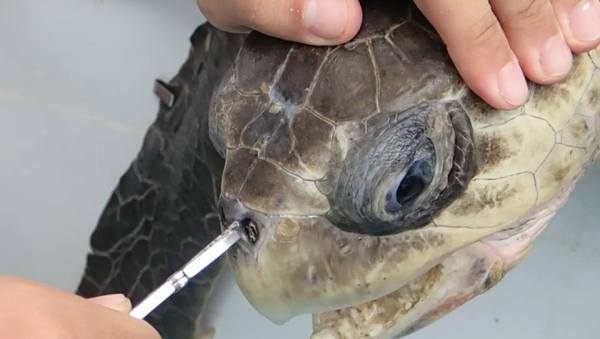Sea turtles are painful when the 12cm suction tube is removed from the nose
The clip back to the whole process of pulling the plastic straw tightly into the nostril, the turtle has received great attention from the online community right after appearing on Youtube.
Surgery to remove 12cm plastic tubes from the nostrils of turtles
As well as pollution of water, soil or air, pollution of the sea is also one of the most painful problems in the world. Recently, two scientists from Texas, USA have strongly urged people not to continue to use plastic once after they directly see the harm they cause to marine life.

The straw is pulled out of the 12cm long turtle's nostril.
During a scientific study of the sea in Costa Rica, two scientists, Christine Figgener and Nathan Robinson, found a rare male male sea turtle suffering from a blocked nose . It is known that the turtle appears in the clip is a rare sea turtle called the pineapple turtle tortoise . It is also known for its scientific name, Lepidochelys Olivacea . At first, the two scientists thought what was inside the turtle's nose was the parasite parasite, but after observing it carefully, they realized, it was a plastic straw.
Summary of rudimentary and painful surgery.
Due to being in the sea far away from the shore and the veterinary center, the two scientists were forced to operate on their own to save the life of the poor turtle. The only thing they had at that time was a small pliers. After 8 minutes of struggling, the two finally pulled out a 12cm long straw from its nostrils. However, the suction tube plugged into the nostrils so deeply that when pulled out, it made the turtle's nose bleed. It seems that because of the pain, the turtle is also uncomfortable with this reluctant surgery.
The clip recorded the whole process of rudimentary surgery posted by YouTube scientist Christine Figgener on Monday. Immediately after appearing on the internet, the clip received great attention from the online community with hundreds of thousands of shares calling for the protection of the marine environment.
On the side of the two scientists, although they did a good job, they would have to pay a fine for violating their research powers.
- Drinking toilet water directly with a smart syringe
- The most exotic turtles in the world
- Philippine Navy saves sea turtles
- Detection of hairy pig nose mice in the longest
- The science explains why our nose is flat, the western tip is high
- Why is the Vietnamese nose low but the Westerners are high?
- New style septic tanks can be attracted from a distance
- Humans have been cheated for hundreds of years by turtles without knowing
- Turtles have two heads and six legs
- Bloody nose, cause?
- Revealing the 'gold' indicator of the perfect nose
- Spectacle of clogged turtles, queuing through strange bridges
 Surprised: Fish that live in the dark ocean still see colors
Surprised: Fish that live in the dark ocean still see colors Japan suddenly caught the creature that caused the earthquake in the legend
Japan suddenly caught the creature that caused the earthquake in the legend A series of gray whale carcasses washed ashore on California's coast
A series of gray whale carcasses washed ashore on California's coast Compare the size of shark species in the world
Compare the size of shark species in the world Ancient giant turtle as big as a rhinoceros, extinct 66 million years ago salvaged
Ancient giant turtle as big as a rhinoceros, extinct 66 million years ago salvaged  Frog-faced turtles are motionless 95% of the time.
Frog-faced turtles are motionless 95% of the time.  A mother turtle weighing nearly 100kg came from Malaysia to Con Dao to lay eggs
A mother turtle weighing nearly 100kg came from Malaysia to Con Dao to lay eggs  Discovering an extremely rare big-headed turtle in Quang Nam
Discovering an extremely rare big-headed turtle in Quang Nam  Taiwan's Turtle Island 'lost its head' after the earthquake
Taiwan's Turtle Island 'lost its head' after the earthquake  Discovered sea turtle carcasses washed up on the beach in Ba Ria-Vung Tau
Discovered sea turtle carcasses washed up on the beach in Ba Ria-Vung Tau 